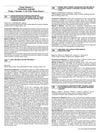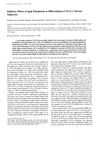 February 2022 in “Mediators of Inflammation”
February 2022 in “Mediators of Inflammation” Women with Polycystic Ovary Syndrome (PCOS) have lower levels of a substance called DIAPH1 in their blood, which is linked to changes in sugar metabolism and insulin resistance.
January 2023 in “Pharmaceutics” AA–TF#15 significantly promotes hair regrowth and could be an effective treatment for androgenic alopecia.
July 2005 in “Indian Journal of Dermatology”  September 2010 in “European Urology Supplements”
September 2010 in “European Urology Supplements” Serum triglyceride levels are not linked to prostate cancer risk.
 September 2010 in “European Urology Supplements”
September 2010 in “European Urology Supplements” Higher urethral PSA levels after prostate removal surgery may be linked to more hair loss and higher PSA levels post-surgery.
 282 citations,
April 2007 in “Journal of Agricultural and Food Chemistry”
282 citations,
April 2007 in “Journal of Agricultural and Food Chemistry” Apple polyphenol, especially oligomeric procyanidins, can reduce fat absorption and lower blood fat levels.
 September 2010 in “European Urology Supplements”
September 2010 in “European Urology Supplements” Opioid use may lower PSA levels, suggesting a possible role in prostate cancer control; PSA testing is useful for detecting prostate cancer; serum triglycerides are not linked to prostate cancer risk; and higher urethral PSA levels may be associated with local hormone activity.
 September 2010 in “European Urology Supplements”
September 2010 in “European Urology Supplements” PSA testing is a reliable method for detecting prostate cancer, and opioids may lower PSA levels, but triglycerides don't affect prostate cancer risk.
 September 2010 in “European Urology Supplements”
September 2010 in “European Urology Supplements” The document does not confirm if radical prostatectomy is the best treatment for locally advanced prostate cancer.

Korean patients with androgenetic alopecia may have a higher risk of heart-related health issues and could benefit from early heart screening and healthier lifestyles.
 18 citations,
July 2001 in “Australian veterinary journal”
18 citations,
July 2001 in “Australian veterinary journal” A cat with skin bumps and itching had high blood fats and skin infections, which improved with diet and medication changes.
 2 citations,
December 1994 in “The Journal of clinical endocrinology and metabolism/Journal of clinical endocrinology & metabolism”
2 citations,
December 1994 in “The Journal of clinical endocrinology and metabolism/Journal of clinical endocrinology & metabolism” The treatment effectively reduced hair growth and was safe for patients with PCOS, but it needs better bleeding control.
 21 citations,
September 2017 in “Journal of Obstetrics and Gynaecology Research”
21 citations,
September 2017 in “Journal of Obstetrics and Gynaecology Research” Chromium supplements don't improve insulin, hormone levels, or cholesterol in women with PCOS but raise testosterone levels.
 16 citations,
April 2007 in “Journal of Obstetrics and Gynaecology Research”
16 citations,
April 2007 in “Journal of Obstetrics and Gynaecology Research” Prostate-specific antigen may be a new marker for excess male hormones in women with polycystic ovary syndrome.
 39 citations,
September 2012 in “Human Reproduction”
39 citations,
September 2012 in “Human Reproduction” Certain genetic variations in the SHBG gene are linked to an increased or decreased risk of PCOS in Mediterranean women.
4 citations,
October 2021 in “Microorganisms” Men with androgenetic alopecia have different scalp oils and microbes compared to those without.
 815 citations,
April 2010 in “The Journal of Clinical Endocrinology & Metabolism”
815 citations,
April 2010 in “The Journal of Clinical Endocrinology & Metabolism” Women with PCOS should be screened for heart disease risk and manage their health to prevent it.
 175 citations,
April 1982 in “Journal of The American Academy of Dermatology”
175 citations,
April 1982 in “Journal of The American Academy of Dermatology” Isotretinoin is highly effective in treating severe acne, rosacea, and gram-negative folliculitis.
 10 citations,
February 2017 in “Hormone Molecular Biology and Clinical Investigation”
10 citations,
February 2017 in “Hormone Molecular Biology and Clinical Investigation” Metformin effectively improves metabolic symptoms in women with PCOS, while alfacalcidiol does not have a significant impact.
 1 citations,
February 2013 in “African Journal of Pharmacy and Pharmacology”
1 citations,
February 2013 in “African Journal of Pharmacy and Pharmacology” Finasteride lowers good cholesterol, raises bad fats, and may increase heart disease risk.
 31 citations,
January 1981 in “Pharmacology & Therapeutics”
31 citations,
January 1981 in “Pharmacology & Therapeutics” Oral retinoids are effective for treating severe skin disorders but have reversible side effects and risks for pregnant women.
 18 citations,
January 2000 in “Food Science and Technology Research”
18 citations,
January 2000 in “Food Science and Technology Research” Apple polyphenols, especially from unripe apples, can help prevent cells from turning into fat cells.
 14 citations,
March 2016 in “Journal of Dermatology”
14 citations,
March 2016 in “Journal of Dermatology” Hair loss links to high blood pressure, high fat levels, and metabolic issues, suggesting early heart disease screening.

IL6 is linked to higher risk of heart disease in people with a certain mouth condition.
 16 citations,
May 2019 in “Hormone and Metabolic Research”
16 citations,
May 2019 in “Hormone and Metabolic Research” Selenium might help with insulin resistance and cholesterol in PCOS, but more research is needed to confirm its benefits.

Older people tend to have higher biotin levels, which are weakly linked to certain blood components and negatively linked to triglycerides; biotin should be checked in patients with high triglycerides or medication-related skin issues, and only supplemented if deficient. Vitamin D and folate deficiencies are linked to specific skin conditions.
 24 citations,
January 2013 in “Indian Dermatology Online Journal”
24 citations,
January 2013 in “Indian Dermatology Online Journal” Balding people may have higher heart disease risk.
 15 citations,
October 2016 in “Journal of The European Academy of Dermatology and Venereology”
15 citations,
October 2016 in “Journal of The European Academy of Dermatology and Venereology” People with hair loss have worse cholesterol levels, possibly linking hair loss to heart problems.
 7 citations,
March 2011 in “Expert Opinion on Drug Safety”
7 citations,
March 2011 in “Expert Opinion on Drug Safety” Exemestane is effective and safe for treating certain breast cancers, with mild side effects, but needs more research on long-term effects.
 3 citations,
August 2017 in “International journal of reproduction, contraception, obstetrics and gynecology”
3 citations,
August 2017 in “International journal of reproduction, contraception, obstetrics and gynecology” People with PCOS have higher levels of PAI-1, which may increase their risk of heart disease and fertility issues.


























